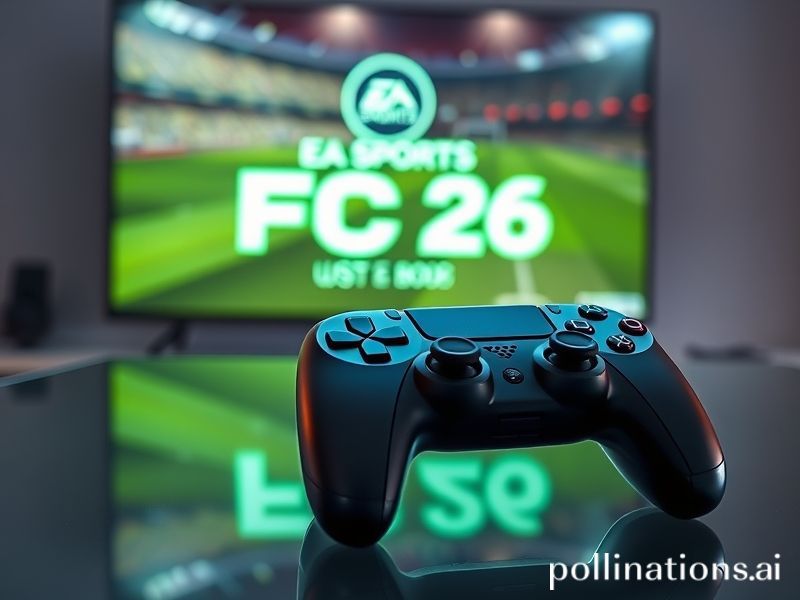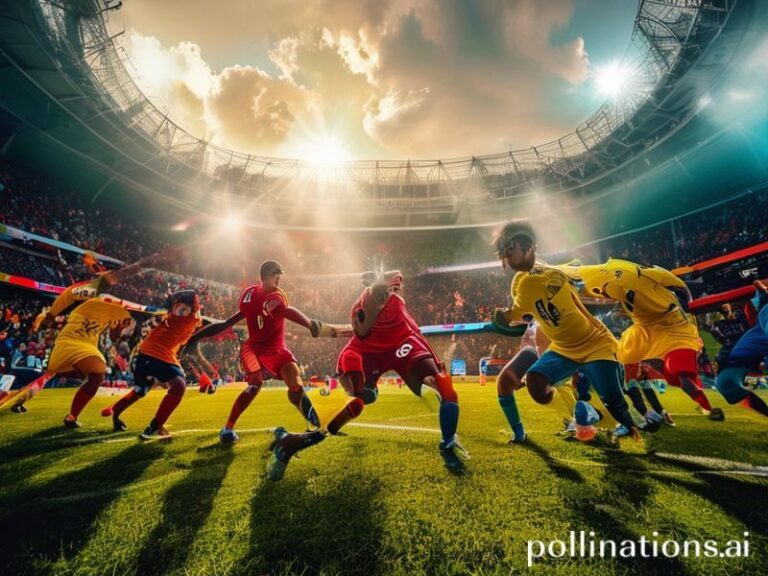FC 26 PS5: How a Football Game Became the World’s Most Expensive Distraction
From the neon canyons of Shibuya to the half-lit favelas of Rio, the phrase “FC 26 PS5” is currently being whispered, screamed, and autocorrect-mangled in more languages than Esperanto ever managed. On the surface it’s just the next annualised instalment of EA Sports’ football sim, freshly varnished for Sony’s shiniest black monolith. But beneath that thin layer of digital grass stains lies a story of geopolitical soft power, currency arbitrage, and the human race’s continuing quest to distract itself from everything that truly matters.
Consider the supply chain: the cobalt keeping your DualSense alive was probably pried from Congolese soil by hands too young to legally play the game. That same controller will vibrate sympathetically when your virtual Mbappé nets a last-minute winner, a neat closed-loop of globalised guilt. Meanwhile, semiconductor wafers shuttle between Taiwan and Arizona like nervous diplomats, each chip carrying the tacit promise that virtual VAR will still be rubbish, no matter how many teraflops you throw at it.
EA Sports markets FC 26 as “HyperMotion V” realism—translation: the sweat beads on Jude Bellingham’s forehead are now individually ray-traced. In a year when real-world stadiums from Kharkiv to Rafah sit hollowed out by actual violence, rendering every bead of simulated perspiration becomes a form of tragicomic excess. One senses the ghost of Juvenal updating his bread-and-circuses maxim: give them Ultimate Team packs and they’ll forget the bread entirely. The packs, incidentally, cost roughly the daily minimum wage in Jakarta, a fact EA buries somewhere between the EULA and the meaning of life.
Cross the Pacific and you’ll find Chinese gamers engaging in an elaborate dance with the Ministry of Culture to secure imported discs via grey-market daigou. Each successful smuggle is celebrated on Weibo with the same fervour once reserved for Olympic golds. In Argentina, where the peso’s value fluctuates like a toddler on a sugar high, Steam gift cards have become a more stable currency than the peso itself; FC 26 micro-transactions are now a hedge against inflation. Somewhere in Frankfurt, a European Central Bank intern is quietly adding “FIFA Points volatility” to the macro dashboard.
The professional scene is no less geopolitically charged. Saudi Arabia’s Public Investment Fund recently bankrolled the eWorld Cup-style “Riyadh Super Cup,” a tournament so lavish it made the actual World Cup look like a parish fête. European purists clutched their pearls, then accepted the appearance fees anyway. After all, nothing says “sporting integrity” quite like flying business class on the same petrodollars that laundered reputation on the back nine at LIV Golf.
But perhaps the darkest joke is saved for the players themselves. FC 26 introduces a “Mental Resilience” attribute—an integer to quantify how well your avatar handles pressure. Meanwhile, actual footballers in the English Championship auction their match shirts to pay rent, and fans in Tehran risk imprisonment for the crime of celebrating a goal too exuberantly. Somewhere in the metaverse, a 14-year-old in Ohio is rage-quitting because his virtual striker missed a sitter, blissfully unaware that his Iranian counterpart just rage-quit life after the morality police confiscated his console.
EA will trumpet record day-one engagement, Sony will boast of hardware attach rates, and the planet will continue to warm at roughly the same speed as a FUT pack opening animation. The servers, scattered across three continents like nervous spores, will hiccup every time a major city experiences rolling blackouts—an irony not lost on the gamers literally burning coal to keep the lights on long enough to finish a Weekend League.
In the end, FC 26 PS5 is less a game than a perfect mirror: a glossy, 4K/120 fps reflection of a world that can coordinate global supply chains for imaginary goals yet struggles to coordinate global vaccine rollouts for real lives. We line up to pre-order the Ultimate Edition because the alternative—watching the actual news—requires a stronger stomach and an even stronger internet connection.
So boot it up, pick your poison, and remember: every virtual goal you score is another minute you’re not doom-scrolling about the collapse of the Antarctic ice shelf. Which, come to think of it, might be the most honest form of carbon offset available.







